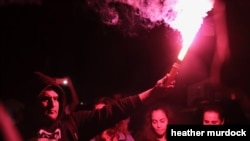Lebanon slipped deeper into a political crisis Sunday as politicians struggled to form a government.
Tens of thousands Lebanese took to the streets in cities and towns across the country to demand a complete overhaul of the political class. Protesters have accused political leaders of corruption and are demanding social and economic reforms and adequate basic services.
The political crisis grew worse after the former finance minister Mohammad Safadi withdrew his name from consideration for prime minister. In a statement released by his office, Safadi said outgoing Prime Minister Sa'ad al-Hariri should be re-appointed to the post.
Hariri quit on October 29 after weeks of protests.
On Sunday, Hariri blamed the protests and the lack of a government on President Michel Aoun's party, calling its policies "irresponsible regarding that national crisis that they country is passing through.''
Aoun's party responded by saying that Hariri wants to dominate the new Cabinet.
Tens of thousands continued the protests as the top politicians traded barbs. Crowds gathered outside the prime minister's office chanted, "The people want to bring down the regime.''
The protests in Lebanon have been violence free compared to other parts of the world. Military officials patrolled the streets but have said they will not stop the demonstrations.
Army chief General Joseph Aoun said, "We did not stop anyone who is protesting in squares, but when they want to close roads and harass people we will intervene."






